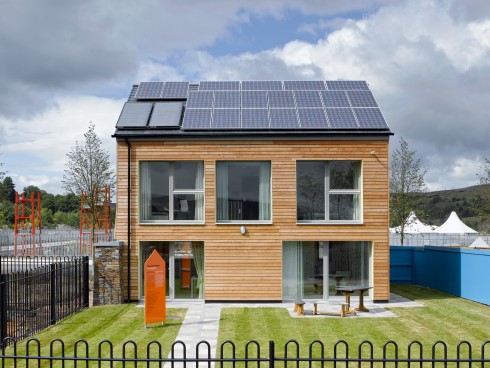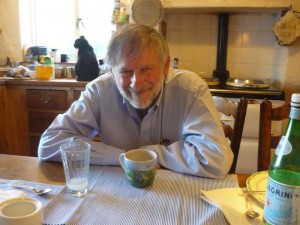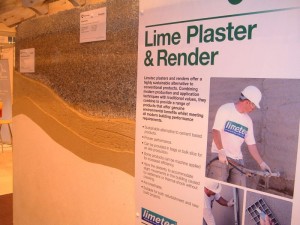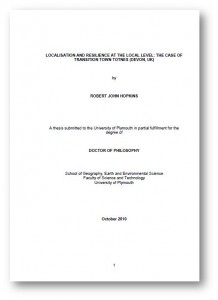Transition Culture has moved
I no longer blog on this site. You can now find me, my general blogs, and the work I am doing researching my forthcoming book on imagination, on my new blog.
Come find me at robhopkins.net
Archive for “Natural Building” category
Showing results 11 - 15 of 61 for the category: Natural Building.
11 Apr 2011
We are now in editing mode for ‘The Transition Companion’ (out in September). The draft is way too long, so some bits are being cut. The following piece has been cut way down, so I wanted to post it in full here, as I rather liked it (!). First there is the piece from the book, and then the interview I did with Justin Bere, in full, a riot of delights for passivhaus/local building materials fans out there….

The 'Larch House' in Ebbw Vale, Wales.
The ‘holy grail’ in terms of the construction of new sustainable buildings is homes that reach the highest level of energy efficiency, whilst also using as high a proportion of locally sourced materials as possible, what we might call ‘The Local Passivhaus’. Two buildings, recently completed in Ebbw Vale, known as ‘The Lime House’ and ‘The Larch House’ have moved this concept forward significantly.
Read more»
23 Dec 2010

I know that I have officially signed off for Christmas, but I can’t resist the temptation to post this now, think of it as my Christmas gift. About 3 weeks ago, I travelled to a snow-covered West Sussex to meet one of my heroes. Christopher Alexander, architect, thinker, designer, author of the seminal ‘A Pattern Language’ and of the more recent extraordinary ‘The Nature of Order’ series of books, has long been someone whose work I have admired greatly. It is sometimes said that it is generally best not to meet your heroes as they usually disappoint, but that wasn’t the case here. I met Chris and his wife Maggie in their beautiful old home (I’m starting to sound like a writer for Hello! magazine), and after lunch and a general chat about the Transition approach (about which Chris knew very little in advance of our conversation), we did the following interview. I am deeply grateful to them both for a fascinating and illuminating afternoon.
Read more»
16 Nov 2010
 Had great fun over the weekend plastering my shower with this amazing stuff called Tadelakt. Tadelakt is a traditional Moroccan plaster, a lime-based, polished waterproof plastering technique. Originally used for waterproofing cisterns, and then used for public bathing houses, Tadelakt had almost disappeared from use before being rediscovered and there is currently a revival in its use.
Had great fun over the weekend plastering my shower with this amazing stuff called Tadelakt. Tadelakt is a traditional Moroccan plaster, a lime-based, polished waterproof plastering technique. Originally used for waterproofing cisterns, and then used for public bathing houses, Tadelakt had almost disappeared from use before being rediscovered and there is currently a revival in its use.
Read more»
9 Nov 2010
Here is a section from my recently completed thesis, which is available here, which looks at the potential of local building materials in the relocalisation process.
“The process of building with bales includes the possibility of making a profound change in the fabric of human societies around the world. In fact this vision is not exclusively a matter of straw bales: the questions we are trying to pose…. are basic: how do we build, and how does that process occur in relation to the community and to the life around us? Straw bales happen to be the material that has inspired many to look at the process of building in a different light”. (Steen et al.1994: xvi).
 In the same way the local food movement shifts its focus from out-of-season, long supply chain, high embodied energy foods towards more locally sourced, low impact foods rooted in the local region or ‘foodshed’ (Kloppenberg et al. 1996), an emerging branch of architecture and construction examine similar transitions with building materials.
In the same way the local food movement shifts its focus from out-of-season, long supply chain, high embodied energy foods towards more locally sourced, low impact foods rooted in the local region or ‘foodshed’ (Kloppenberg et al. 1996), an emerging branch of architecture and construction examine similar transitions with building materials.
Read more»
9 Nov 2010
 Three years in the making, I am delighted to announce the completion and availability of my PhD thesis, which offers the most in-depth study yet of the Transition concept in practice. It can now be ordered here. Exhaustively referenced and comprehensive in its analysis of the thinking underpinning Transition and of its impacts in practice (running to over 90,000 words), ‘Localisation and Resilience’ is a pivotal addition to the literature on this fast-growing response to peak oil and climate change. It takes as its focus the Devon town of Totnes, the UK’s first Transition initiative, looking in detail, using interviews, oral history, focus groups, surveys, World Cafe and Open Space methods, at the impact Transition Town Totnes has had during its four year existence. It also takes a detailed look at the literature on resilience, and argues that the combination of resilience thinking, localisation and social enterprise offer a powerful tool for the economic revival of communities and for achieving a low carbon economy. If you are interested in resilience, sustainability, Transition, and the future of local economies, this is an essential new publication.
Three years in the making, I am delighted to announce the completion and availability of my PhD thesis, which offers the most in-depth study yet of the Transition concept in practice. It can now be ordered here. Exhaustively referenced and comprehensive in its analysis of the thinking underpinning Transition and of its impacts in practice (running to over 90,000 words), ‘Localisation and Resilience’ is a pivotal addition to the literature on this fast-growing response to peak oil and climate change. It takes as its focus the Devon town of Totnes, the UK’s first Transition initiative, looking in detail, using interviews, oral history, focus groups, surveys, World Cafe and Open Space methods, at the impact Transition Town Totnes has had during its four year existence. It also takes a detailed look at the literature on resilience, and argues that the combination of resilience thinking, localisation and social enterprise offer a powerful tool for the economic revival of communities and for achieving a low carbon economy. If you are interested in resilience, sustainability, Transition, and the future of local economies, this is an essential new publication.
Read more»



 In the same way the local food movement shifts its focus from out-of-season, long supply chain, high embodied energy foods towards more locally sourced, low impact foods rooted in the local region or ‘foodshed’ (Kloppenberg et al. 1996), an emerging branch of architecture and construction examine similar transitions with building materials.
In the same way the local food movement shifts its focus from out-of-season, long supply chain, high embodied energy foods towards more locally sourced, low impact foods rooted in the local region or ‘foodshed’ (Kloppenberg et al. 1996), an emerging branch of architecture and construction examine similar transitions with building materials.  Three years in the making, I am delighted to announce the completion and availability of my PhD thesis, which offers the most in-depth study yet of the Transition concept in practice. It can now be ordered
Three years in the making, I am delighted to announce the completion and availability of my PhD thesis, which offers the most in-depth study yet of the Transition concept in practice. It can now be ordered 
